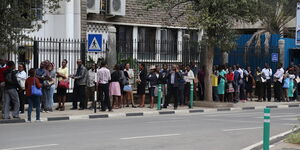The Energy Petroleum and Regulatory Authority (EPRA) disclosed how select motorists save over Ksh1,400 daily in operations costs amid the high fuel prices.
In its quarterly newsletter covering July to September, the authority detailed that the trick behind the savings was the adoption of electric vehicles.
According to EPRA's estimations, a fuel-run vehicle covering 240 kilometres within that period used Ksh2,831 in fuel costs. On paper, 240 kilometres is a trip from Nairobi to Narok and back.
Conversely, an electric vehicle covering the same distance spent Ksh1,418. At peak hours, the EVs used 45 units, each going for Ksh29.06.
During off-peak hours, the vehicles used 37 units, each going for Ksh18.09.
According to EPRA, fuel prices within the 2023 Q3 were averaging Ksh194.68.
"The primary factor contributing to these savings is the price of energy or fuel. Electricity, which powers EVs, tends to be significantly cheaper on a per-mile basis compared to internal combustion engine cars.
"The disparity in operating costs between EVs and fuel-based vehicles can be further underscored by examining fuel or energy costs. Charging an EV is typically more cost-effective per kilometre travelled than refuelling an internal combustion engine car. The exact savings depend on several factors, including electricity rates and charging habits," EPRA detailed.
Concerning buses, electric bus drivers saved over Ksh7,236 compared to fuel-run vehicles travelling 240 kilometres. Electric bodaboda riders covering a similar distance saved Ksh505.
"These vehicles have fewer moving parts than their vehicles, eliminating the need for routine oil changes and other maintenance tasks that are common with internal combustion engine vehicles," read the newsletter in part.
The revelation by EPRA comes amid plans by the Ministry of Transport to encourage investors and Kenyans to embrace e-mobility.
Transport Cabinet Secretary Kipchumba Murkomen, during a meeting with transport stakeholders on Thursday, November 30, indicated that the government would work with the Matatu Owners Association (MOA) on the technology that mitigates Climate Change.
"We are working with stakeholders in the sub-sector to fast-track a shift from petrol and diesel-powered vehicles to electric vehicles to combat climate change, as well as promote their participation in the planned rollout of the Bus Rapid Transit (BRT) system as a way of reducing traffic congestion, promoting safety and security of passengers and drivers, and enhancing efficiency and professionalism in the industry," he stated.
As of September 2023, there were 1,350 registered EVs in the country.












